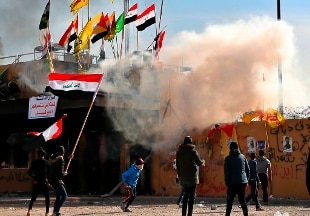- Iraq, Press: Italian soldiers leaving US base in Baghdad. Germany announces troop withdrawal
- Germany announces the withdrawal of troops in Iraq: they will be moved to Jordan and Kuwait
- New US attack in Iraq, pro-Iranian militia hit. Killed a commander
- Iran. US forces on high alert, drone attacks feared
- Oceanic crowd for the last farewell to Qassem Soleimani. Iran studies plans for revenge
- Iran, the body of General Soleimani has arrived. "If the US does not withdraw it will be more Vietnam"
Share
January 07, 2020The Italian military remains in Iraq, but about 40 go away from the American compound Union 3, in the center of Baghdad, a few meters from the US embassy. The base is no longer secure after the tension triggered by the killing of the Iranian general Qassem Soleimani, centered by a drone in the Iraqi capital.
The defense minister, Lorenzo Guerini, in an interview defined "articulate and frank" with his US colleague Mark Esper, invited the ally "to moderation, dialogue, a sense of responsibility" and to coordinate in the future to "continue "commitment of the anti-Daesh coalition within a security framework for our military". For his part, Esper thanked the minister and called Italy's decision to stay in Iraq "important", reiterating that Americans do not want to leave the country.
The US blitz against Soleimani provoked, however, a series of decisions. NATO has announced the temporary withdrawal of part of its personnel deployed in the Middle Eastern country. Similar decision by Germany, Canada and Croatia. The French, like the Italians, however, will remain.
Union 3 hosts the command of the international anti-Isis coalition involved in the 'Inherent resolve' operation: about 1,800 soldiers from various countries present. The base is now more than ever a possible target of attacks and the coalition leaders have planned the deployment of part of the assets for security reasons. The Italians affected by the transfer are about forty, as far as we learn: mainly carabinieri, plus some soldiers of the staff of the commander of the national contingent, general Paolo Attilio Fortezza; about 30 were taken to more protected places, always in the capital; ten to Erbil.
The Defense General Staff explained that the pause in training activities and the displacement of the military are part of "contingency plans for the protection of the personnel employed". Therefore, no interruption "of the mission and commitments made with the coalition" but a decision that depends "on the security measures taken". The warning and security measures, it is specified, "are decided at the international coalition level in coordination with the various partner nations".
Guerini also insisted on the security problem in his conversation with Esper. "With about 1000 men in Iraq, over 1000 in Lebanon in the Unifil mission and just under 1000 in Afghanistan - he recalled - Italy is among the countries most committed to the stability of the region". It is therefore important, he stressed, "to cope with future developments in a coordinated manner" to continue our commitment in "a security framework for our military". The priorities for Italy, he stressed, "are the stability of the region and Iraq and the need to put in place every effort to preserve the results of the struggle against Daesh achieved in recent years".
After the USA, Italy is the country that supplies the largest number of soldiers to the coalition. There are just over 900: a third is deployed in Kuwait, the rest in Iraq, between Erbil - where 450 Italian soldiers train the Kurdish peshmerga - Kirkuk (about ninety) and Baghdad (about fifty, mostly engaged in the Task Force Police that trains Iraqi security forces). And together with Iraq, there are three other missions that concern the Italian military leaders: Libya, Lebanon and Afghanistan. For now, the contingents remain in the theaters, but the security measures have been raised to the highest levels: reduced exits and rigid controls at the compound entrance.
Chaos US troops
Meanwhile, on the announced withdrawal of the American contingent from Iraq, official stars and stripes sources say that the possibility has never been taken into consideration. An American general explained that the letter cited by some media in which the US withdrawal from Iraq was mentioned was an unsigned and poorly formulated draft that aimed to emphasize the increased level of the movement of troops, but that should not have been sent. According to the chief of command, Mark Milley, "it was a mistake by Mckenzie", that is, the commander of the US central command and "it should not have been sent". President Trump also spoke on the subject to say that "a US withdrawal would be the worst thing for Iraq and would leave Iran with a much greater influence."

